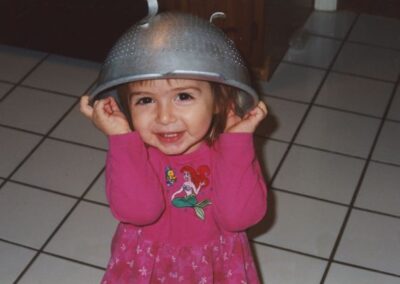I was driving my 8-year-old daughter to soccer practice last night. (This is the same daughter I wrote about last week when my husband and I made the decision to move her from Catholic to public school next fall.) I find driving in the car with my children, especially when it’s one-on-one, is a great time to learn things that are going on in their lives. Maybe it’s the fact that they can talk from the back seat of the car with no one looking at them as they bring up the things that worry or confuse them. And that’s exactly what happened last night.
Olivia told me that one of her friends, another child in her third-grade Catholic school class, whom we will call X, told her and some other children that X’s family does not believe that Communion is the body and blood of Jesus Christ. I could feel myself tensing up as I tried to respond in a charitable yet clear way. Then my daughter said that this isn’t the first time her friend has tried to pound home this alternative view on Catholic teaching. I told Olivia that the next time this happens she needs to tell X that if you don’t believe in the Eucharist, you aren’t a Catholic. Harsh? Perhaps. True? Absolutely. I tried to explain to Olivia that people can disagree with the Church on some things, but that you cannot disagree with the Church on Eucharist and still call yourself a Catholic.
A new Pew Forum study on Religion & Public Life shows that roughly two-thirds of Americans who claim “no affiliation” with a church were raised Catholic or Protestant and have changed faiths twice. The study also found that Mass attendance was a “powerful predictor” of whether a child would remain Catholic as an adult. Among the lifelong Catholics surveyed, 69 percent of those who regularly attended Mass as a teen remained Catholic, while only 44 percent of those who are now “unaffiliated” attended Mass regularly.
The big news, however, is that Catholic education, which included not only Catholic school education but religious education and youth ministry programs, had a “negligible impact” on whether a Catholic child would remain Catholic as an adult. How could that be? Well, let’s go back to my daughter’s classmate, whose Catholic family thinks it’s important enough to send their children to Catholic school but not important enough to understand or believe the teachings of the faith.
Our Catholic formation programs — in schools and in parishes — continue to be ineffective in producing knowledgeable Catholics who understand what it truly means to be a Catholic. And, if you don’t know what it means to be a Catholic, you don’t have any reason to be loyal to your faith or your Church. Our schools, our religious education programs, our pastors, our bishops must find a way to transmit the truth of our teachings in an unequivocal way.
If our Catholic schools are not clearly teaching the meaning of Eucharist, we have failed. If our teachers or parish leaders are telling Catholic children and adults that there is room to disagree on issues like abortion, we have failed. If our Catholic high schools do not ensure that children get to Sunday Mass when they are away on a school trip, we have failed. If our pastors do not speak clearly about our teachings from the pulpit on Sundays, we have failed. The reality is that many of the Catholics who leave the Church never really understood their beliefs in the first place. They don’t even know what they are leaving behind because if they did, they would never leave.
My daughter told me that she explained to her friend that Communion is Jesus, not a symbol for Jesus. As I drove toward the soccer field, I told her how proud I was that she was willing to stand up for what she believes in even when it wasn’t easy or popular. She didn’t get that from a religion class, she got that from home and from Mass. If we want to keep Catholics Catholic for the long haul, we need to get families back into the pews and faith back into the home.





